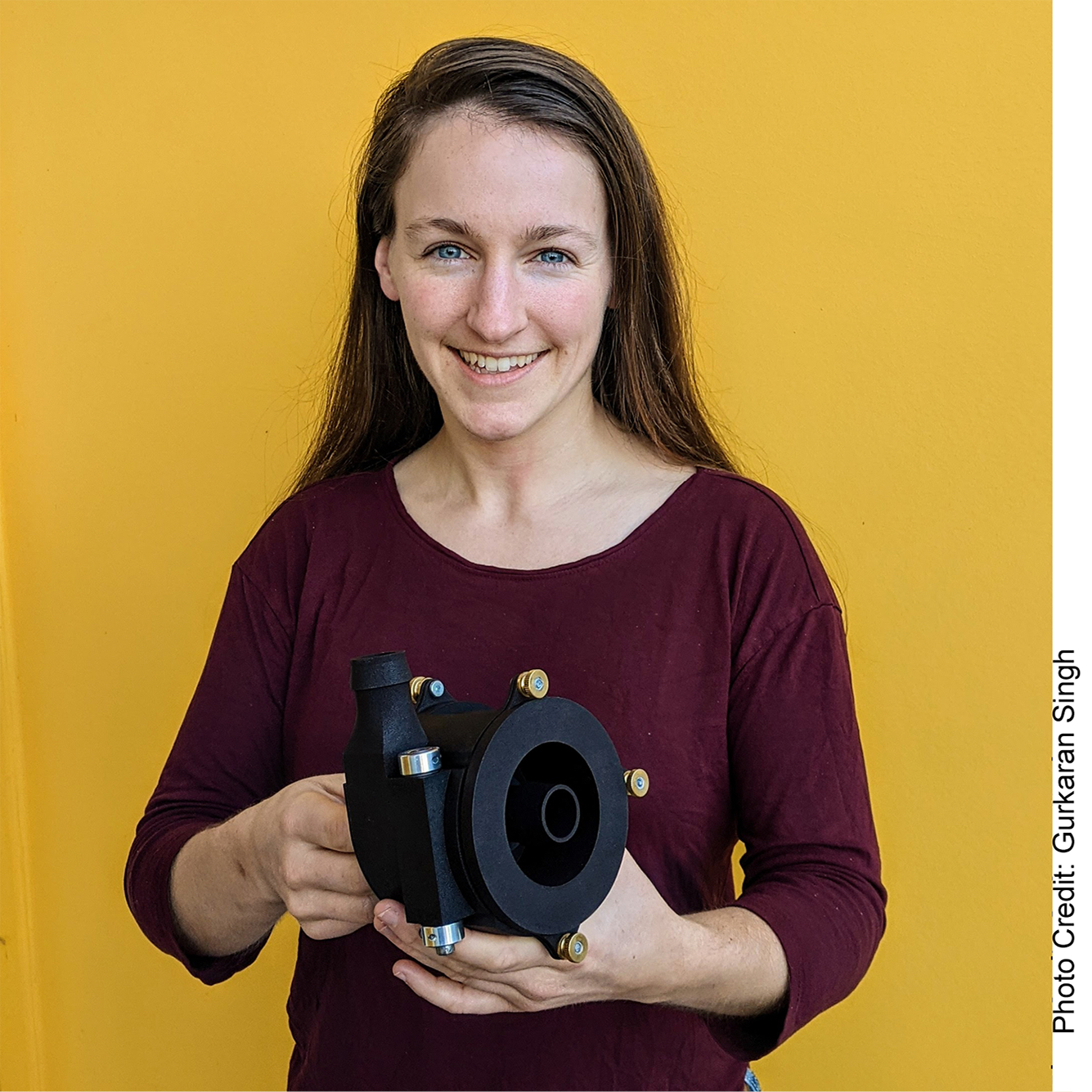Hilary Johnson
Hilary Johnson, a PhD candidate in the Department of Mechanical Engineering at the Massachusetts Institute of Technology (MIT), invented an adaptive centrifugal pump, an innovation with worldwide implications for an industry that everyone relies on but few know about. Hilary’s invention dramatically expands the efficiency range of pumps used to transport water for local clean water supply, wastewater treatment, and crop irrigation. Traditional centrifugal pumps cannot adapt to meet flow needs that are variable. This results in wasted energy and money. Hilary’s invention is a “variable volute,” referring to the spiral water chamber that changes, expands, or contracts in response to variable flow rates in key applications. Hilary was awarded the 2021 $15,000 “Eat It!” Lemelson-MIT Student Prize for her inventive work.
Hilary is an Oregon native and attended the United World College in Mostar, Bosnia and Herzegovina (BiH) to finish high school. There, far from her family, Hilary learned about the beauty and importance of clean water as well as grit and determination. Hilary, concerned about water and sewage processing in BiH, wrote her senior thesis using system dynamics and shared it with the city’s water board. She returned to the U.S. to attend Dartmouth College, determined to become an engineer to help solve problems like the ones she had witnessed in BiH.
Her tenacity has paid off many times and was highlighted in March 2020 when MIT’s on-campus operations shut down due to COVID-19. Hilary lost access to research facilities and large-scale experimental equipment. She quickly shifted to build a backyard, scalable water pump, enlisting her family and partner as “volunteer” research assistants to help further her work. Hilary also ran experiments in her bathtub, continuing her work undeterred.
Hilary sees the Lemelson-MIT Student Prize as a unique opportunity to articulate her research and showcase the often-unseen world of pumps. It also facilitates her long-term work combining research and industry applications, consistent with her collaboration with Xylem Inc., a global water technology company with $5 billion in annual revenue. Hilary’s work on pumps also recently won her first place for the 2021 J-WAFS World Water Day Video Competition: MIT Research for a Water Secure Future, sponsored by MIT’s Abdul Latif Jameel Water and Food Systems Lab (J-WAFS). The competition asks MIT students to submit a video to explain their solution to water-sector challenges. Both Xylem and J-WAFS are supporting Hilary’s research, acting as strategic partners to advance her technology.
At the center of Hilary’s work is empathy and a personal motto to “improve human flourishing.” That motto is also realized in her secondary invention, a hand-held device called Braille-It that creates Braille labels for everyday objects to empower the 40 million people with blindness across the world. Braille-It is precise and affordable, and can be made and assembled for less than $10 per device. It works for over 132 Braille languages, and embosses onto ScotchTM magic tape, which is easily available and inexpensive. Early development, pilot testing, and patenting for Braille-It has been funded by Microsoft’s Make What’s Next Program and a grant from MIT’s Sandbox Innovation Fund. Hilary is in the process of launching a small production run and engaging a sales and marketing team to build collaborations in the U.S. and India, beachhead markets for the device.
Hilary sees mentorship as another guiding principle in her life. She’s thankful for the rich mentorship she’s received from many including her advisor, Prof. Alex Slocum, and she strives to pay it forward. She describes herself as the “Official Encourager” in various organizations, and has been involved in MIT MakerWorkshop for years, now serving as President Emeritus. She is also Vice President of the Board for the Wheelock Society at Dartmouth, an intergenerational community of students, faculty and alumni who integrate faith, reason and vocation, and welcome opportunities for reflection, faith, and epistemology.


